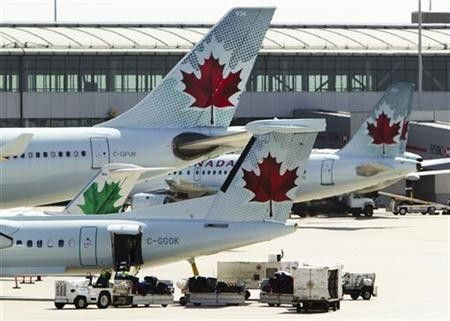Air Canada, union offer conflicting strike messages

The government, Air Canada and one of its unions sent out conflicting signals on Wednesday on the chance of an Air Canada strike, prompting mass confusion from travelers booked to fly on the country's largest airline.
The union representing Air Canada's 6,800 flight attendants said they were still preparing to go on strike at one minute past midnight after workers rejected a deal at the weekend.
But Labor Minister Lisa Raitt said the strike would be halted because she was referring the dispute to the Canadian Industrial Relations Board (CIRB), and Air Canada said its flight schedule would operate as normal.
This is definitely yo-yo stress that is not needed right now, said Jackie Engeland, a bride-to-be who is due to fly to her wedding in Cuba on Air Canada on Friday.
This wedding trip has been booked for well over a year and I'm left wondering if it's going to happen, she said in a posting on Air Canada's Facebook page.
The government says Canada's fragile economy cannot afford a strike at Air Canada, which flies to more than 150 destinations around the world and has Canada's most extensive flight network by far.
Ottawa drafted back-to-work legislation for two previous labor disputes at the airline, but would find it hard to pass such legislation quickly on this occasion, given that Parliament is not sitting this week.
Labor relations experts said the government's decision to try to block a strike using the CIRB, an independent, quasi-judicial tribunal that administers and interprets parts of the Labor Code, was unprecedented.
The CIRB has never been used to suspend a strike, said George Smith, a research fellow in the school of policy studies at Queen's University in Kingston, Ontario.
He said the board is usually asked to rule whether job action or lock-outs by employers are legal, but in this instance, the union is clearly in a legal position to strike.
And the job action is typically not suspended until the board makes a ruling, something that can take days or weeks.
Another analyst suggested the government was overstepping its mark in wanting to shut down a strike at Air Canada, a company it regards as an important driver of the economy.
What I'm watching is a government that appears to be addicted to back-to-work legislation, said Paul Cavalluzzo, a senior partner and labor lawyer at Toronto firm of Cavalluzzo Hayes Shilton McIntyre & Cornish.
They are interfering in the collective bargaining process and when you have this kind of government interference, you're going to skewer the whole process so that it won't be effective any more, he said.
The looming strike comes after flight attendants for a second time rejected a tentative labor agreement negotiated by their union and Air Canada, prompting Air Canada to doubt the logic of further talks and question the legitimacy of the union's representatives.
CUPE said it was ready to return to the bargaining table.
Amid the confusion, Air Canada's stock was up 2 Canadian cents, or 1.5 percent, at C$1.40 on the Toronto Stock Exchange. The airline insisted there would be no strike.
We clearly understand that no strike action or lock-out can take place while the matter is before the CIRB, Air Canada spokeswoman Angela Mah said. We're puzzled at CUPE's current position.
© Copyright Thomson Reuters 2024. All rights reserved.





















